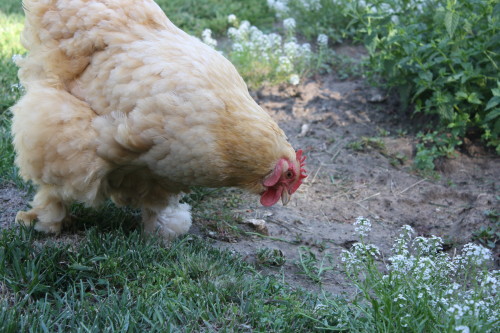Parasites in Poultry & How to Handle Them

Discovering your flock has a pesticide problem usually leads to a mad scramble to eradicate it immediately. But that may not be the best solution. Whether you have a small or large flock permanent eradication is not possible, but what is possible is to manage the parasite population.
There are risks in unchecked infestations, make no mistake about that. Diminished egg production, weight loss, or even significant die-off can happen, and it can happen in a short period of time.
Attempts to permanently eradicate parasites can leave flocks more at risk because they are not developing natural immunities that are developed with low levels of infestations. Sounds strange, I know.
Birds that live outside, scratching in the dirt, chewing on bugs, grubs and other crawlers are building natural immunity, while birds that are raised and housed in wire floored areas are not coming into contact with the elements that help them build natural immunity.
The most common poultry parasites, common to most areas of the U.S., fall into two broad categories—common internal parasites and external parasites.
INTERNAL PARASITES
Common internal parasites include roundworms, tapeworms, cecal worms, and capillaria.
To manage internal parasites, keep birds on clean ground. Parasites drop eggs on bedding and coop litter, which can then be picked up by the birds. Keeping the litter dry and fresh hinders the growth of the parasites. Giving the birds adequate roosts and a larger area in which to roam, means they will not be walking on their own manure which will also help. Keep in mind, though, that birds wandering outside can then become victim to birds of prey or feral cats.
Non-organic treatments for internal parasites can include: piperazine, phenothiazine, or dibutyltin dilaurate.
Organic treatments for internal parasites can include diatomaceous earth mixed into the feed.
EXTERNAL PARASITES
Common external parasites include poultry lice and mites.
To manage external parasite infestation, flocks should be checked regularly. Nesting boxes and floor litter should also be cleaned and changed regularly. Any detection of mites or lice should be treated early to prevent more extensive infestations throughout the flock.
Lice can be treated topically with nicotine sulphate, malathion 4-7% dusts or stiros.
Organic treatments for lice can include dusting poultry with diatomaceous earth and sprinkling it onto nesting box bedding.
Rather than eradicating parasites, the goal should be to create conditions that limit the parasite population, while also allowing birds to build up natural immunity. Sanitation is key to preventing an infestation of both internal and external parasites.
Recent comments
Aenean nonummy hendrerit mauris. Phasellus porta.